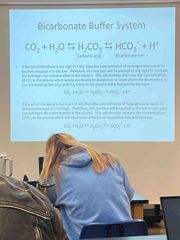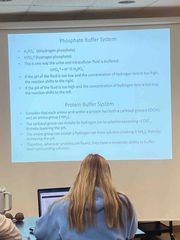![]()
![]()
![]()
Use LEFT and RIGHT arrow keys to navigate between flashcards;
Use UP and DOWN arrow keys to flip the card;
H to show hint;
A reads text to speech;
27 Cards in this Set
- Front
- Back
|
intracellular fluid |
fluid inside the cell. |
|
|
extracellular fluid |
fluid outside the cell. |
|
|
plasma |
fluid portion of the blood. |
|
|
interstitial fluid |
extracellular fluid in the loose CT. |
|
|
electrolytes |
ionic compounds that separate in water; ex. NaCl -> Na+ + Cl- |
|
|
nonelectrolytes |
covalent compounds that don’t separate in water; ex. glucose. |
|
|
Discuss the thirst mechanism |
blood volume goes low out of the normal range. BP is dropping and the hypothalamus is what picks up on it. It is going to send thirsty conscious thoughts to the cerebrum. Communicating to the cerebrum. |
|
|
obligatory water loss |
the minimum amount of water required to dissolve urine wastes. |
|
|
water intoxication |
consuming too much water in a short period of time -> cramping, cerebral edema, vomiting, coma, death. |
|
|
alkalosis |
a blood pH > 7.45; overexcites the nervous system -> tremors, nervousness, convulsions. |
|
|
acidosis |
a blood pH < 7.34; depresses the nervous system -> coma, death. |
|
|
hypernatremia |
too much sodium -> high BP, edema, CHF. |
|
|
hyponatremia |
too little sodium -> dehydration, shock. |
|
|
hyperkalemia |
too much potassium -> weakness, paralysis, bradycardia, arrhythmia. |
|
|
hypokalemia |
too little potassium -> weakness, arrhythmia, cardiac arrest. |
|
|
hypermagnesemia |
too much magnesium -> respiratory depression, lethargy, coma. |
|
|
hypomagnesemia |
too little magnesium -> tremors, convulsions. |
|
|
hyperchloremia |
too much chlorine -> metabolic acidosis, rapid breathing, unconsciousness. |
|
|
hypochloremia |
too little chlorine -> metabolic alkalosis. |
|
|
hypercalcemia |
too much calcium -> kidney stones, arrhythmias. |
|
|
hypocalcemia |
too little calcium -> tremors, convulsions. |
|
|
Discuss the bicarbonate buffer system |

Back (Definition) |
|
|
Discuss the phosphate buffer system and Discuss the protein buffer system |

Back (Definition) |
|
|
respiratory acidosis |
low blood pH due to shallow breathing or pneumonia -> increased concentration of CO2 -> low pH. |
|
|
respiratory alkalosis |
high blood pH due to hyperventilation -> decreased concentration of CO2 -> high pH. |
|
|
metabolic acidosis |
low blood pH due to reasons other than respiratory; ex. alcohol, diarrhea, diabetes, kidney failure. |
|
|
metabolic alkalosis |
high blood pH due to reasons other than respiratory; ex. vomiting, antacid abuse, constipation. |

